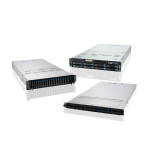New servers lineup achieves multiple world records, including No.1 result for dual-socket performance on across SPEC CPU2017 benchmarks
KEY POINTS
- AMD EPYC 7003-based server portfolio: Dual-socket and single-socket servers in 4U, 2U and 1U for data centers, HPC and AI
- Record-breaking performance, verified by SPEC.org: RS720A-E11 achieves No.1 results for dual-socket servers on across SPEC CPU2017 benchmarks
- New architecture, chassis and modular design: Easy configuration scale-up to meet increasing data-center workloads
TAIPEI, Taiwan–(BUSINESS WIRE)–#ASUSAMDSERVER–ASUS, the leading IT company in server systems, server motherboards and workstations, today announced the introduction of a comprehensive server portfolio based on the latest AMD EPYC� 7003 series processors.
The all-new offerings feature both dual-socket and single-socket servers in 4U, 2U and 1U chassis with new architecture, chassis and modular design to improve system flexibility and scalability. They also deliver support for the latest PCI Express� (PCIe�) 4.0, OCP 3.0 and BMC technologies to drive leading performance and improved TCO with better server performance.
AMD EPYC 7003-based server portfolio
The new ASUS RS720A, RS700A, RS520A and RS500A-E11 series servers offer refreshed designs based on both dual-socket and single-socket AMD EPYC 7003 series processors. ASUS will also offer BIOS updates to enable servers based on previous-generation EPYC 7002 processors, including ESC4000A-E10, RS620SA-E10-RS12 and RS500A-E10 series, to leverage all the features of this new generation, ensuring improved and consistent performance, as well as compatibility with the latest AMD platforms.
This new range will be bolstered by forthcoming ASUS ESC1 series GPU servers in 4U chassis to support up to eight NVIDIA GPUs or Xilinx FPGA accelerator cards in a single system, and optimized for AI, deep learning and HPC workloads. A complete list of all ASUS server products is available at: https://www.asus.com/Commercial-Servers-Workstations.
Enhanced server and infrastructure security will be implemented in these new series by integrating PFR FPGA2 as the platform Root-of-Trust solution for firmware resiliency, plus regular firmware threat detection guard against and recover from security attacks.
The latest AMD EPYC 7003 series processors aim to offer incredible performance and continue to raise the bar for the modern data centers. Based on the Zen 3 core architecture, the latest AMD EPYC processors help businesses deliver better time to results, expected to provide up to double-digit generational performance gains. EPYC 7003 series CPUs can help companies maximize the benefit from their software investment and provide attractive ROI benefits for data centers.
Record-breaking performance, verified by SPEC.org
Taking advantage of the AMD EPYC 7003 processors� compute leadership performance, the new ASUS RS720A-E11 server achieved the No. 1 result for performance with dual AMD EPYC 7763 processors � securing a top ranking across SPEC CPU2017 benchmarks, including integer rate, floating-point rate, integer speed and floating-point for compute-intensive applications.
The results demonstrate that RS720A-E11 continues ASUS leadership with the new AMD EPYC processors, delivering outstanding performance for the server industry.
ASUS CPU-balanced architecture
The new AMD EPYC 7003 series processors excel at providing full features and functionality for both dual-socket and single-socket platforms. The new ASUS servers introduce a CPU-balanced architecture to enable secure and optimal CPU-performance efficiency. This architecture extends the full bandwidth to either dual- or single-CPU configurations, enabling more computing capability and much-improved overall power efficiency for compute-intensive workloads. This architecture allows customers to take full advantage of bandwidth capabilities of the dual-CPU architecture with a single CPU, while offering the flexibility to upgrade later with the addition of a second CPU.
Versatile modular design
The latest ASUS servers introduce a new modular design to enable the easy scale-up of configurations to meet increasing data-center workloads. For example, the design of the onboard LAN module design allows the default rear-panel LAN port to be replaced with either up to four 1 Gb or two 10 Gb LAN ports, and one rear-panel PCIe 4.0 slot can be switched for an OCP 3.0 module � enabling data center-grade transfer speeds of up to 200 GB/s.
Scalable storage solutions
ASUS servers based on the new AMD EPYC 7003 series processors feature scalable storage solutions to support maximum performance for data-center flexibility, and enable industry-standard SAS/SATA/NVMe interfacing through Broadcom Tri-Mode RAID adapters for increased connectivity and security. Flexible NVMe drives on the front panel enable extensive storage and high-throughput performance, with more storage placements on middle and rear panels available for further capacity expansion.
Remote IT-infrastructure management
With this generation, ASUS is also introducing the new ASUS ASMB10-iKVM server-management solution to support the latest AMD platforms. Building upon the ASPEED 2600 chipset running on the latest AMI MegaRAC SP-X that delivers faster BMC boot time up to 39% compared to the 2500 chipset and featuring enhanced BMC networking performance, all ASUS servers come with this solution and enable out-of-band server management through WebGUI, Intelligent Platform Management Interface (IPMI) and Redfish� API interfaces. ASUS Control Center (ACC) is an integrated IT software enabling remote BIOS updates, monitoring of multiple systems via mobile devices, and one-click software updates and dispatching, allowing easier server management for any IT infrastructure.
A summary of ASUS series servers
ASUS RS720A-E11 series servers are high-performance dual-socket 2U servers support for up to 32 DIMMs, four dual-slot GPUs, 24 NVMe drives, nine PCIe 4.0 slots and two M.2 all in one system, and ideal for HPC, AI training and data analytics.
ASUS RS700A-E11 series servers are also high-performance dual-socket servers, yet in a compact 1U chassis with up to 32 DIMMs, one dual-slot GPU, 12 NVMe drives and three PCIe 4.0 slots. They�re designed for HCI, cloud and virtualization environments.
ASUS RS520A-E11 series servers are mainstream, 2U single-socket systems with remarkable performance, including two dual-socket GPUs supports, 24 NVMe drives and seven PCIe 4.0 slots. They�re a great good choice for enterprise and data centers.
Finally, for edge servers or SMB applications, ASUS RS500A-E11 series servers feature a single-socket CPU with support for 16 DIMMs, 12 NVMe drives and four PCIe slots.
NOTES TO EDITORS
ASUS Global News: https://www.asus.com/news
ASUS Global Facebook: https://www.facebook.com/asus
ASUS Global Twitter: https://www.twitter.com/asus
ASUS Business LinkedIn: https://www.linkedin.com/showcase/asus-business/
About ASUS
ASUS is a multinational company known for the world�s best motherboards, PCs, monitors, graphics cards, servers and routers, and is ranked by Laptop Mag as the best laptop brand in 2020. Along with an expanding range of superior gaming, content-creation and AIoT solutions, ASUS leads the industry through cutting-edge design and innovations made to create the most ubiquitous, intelligent, heartfelt and joyful smart life for everyone. With a global workforce that includes more than 5,000 R&D professionals, ASUS is driven to become the world�s most admired innovative leading technology enterprise. Inspired by the In Search of Incredible brand spirit, ASUS won more than 11 awards every day in 2020 and ranks as one of Forbes� World�s Best Regarded Companies and Fortune�s World�s Most Admired Companies.
AMD, the AMD arrow logo, EPYC, and combinations thereof are trademarks of Advanced Micro Devices, Inc.
1 The ESC series servers will be available in Q3, 2021.
2 The PFR module is an optional extra, and must be specified at the time of purchase.
Contacts
PRESS
Irene Chang
Product Marketer
[email protected]
Melissa Power
Interprose for ASUS
[email protected]








